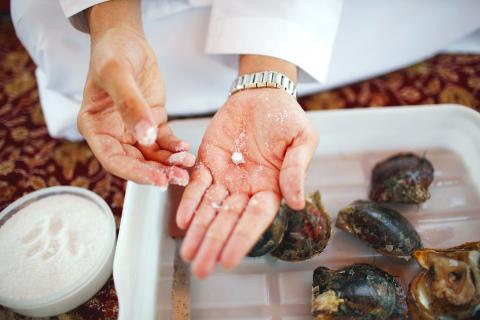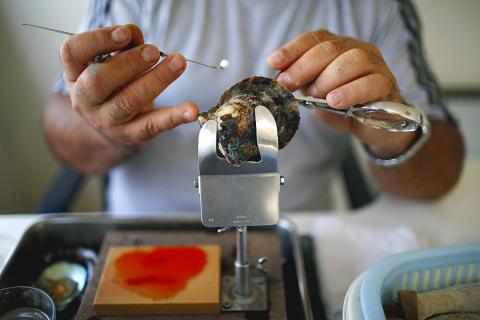Abdulla al-Suwaidi dreamed of reviving a long-lost part of Middle Eastern culture when he seeded his first oyster with a tiny bead and placed it in the warm waters of the Gulf in 2004.
Almost a decade later, the cofounder and vice-chairman of RAK Pearls is finally seeing the fruits of his labor with the first auction of cultured pearls from RAK’s oyster farm off the coast of Ras al-Khaimah, one of seven emirates that make up the United Arab Emirates.
“We’re seeing today a revival of a culture, a treasure that’s been lost to us for many, many years,” al-Suwaidi said in an interview.

Photo: Reuters
Natural pearl diving was once the main income of many families in the region, but it vanished after World War I with the development of vast oil reserves in the Gulf and the rise of competition from Japanese cultured pearls.
RAK Pearls, the region’s only cultured pearl producer, now has about 40,000 oysters bedded down in the Gulf’s briny waters and in June, the Dubai Multi Commodities Centre Authority (DMCC) held an exclusive auction for some of its produce.
“Dubai has been a trading center of pearls for many years, but this is the first time that we auction locally cultivated pearls with a quality that surpasses anything that you’ve seen farmed in countries like China and Japan,” DMCC executive vice chairman Ahmed bin Sulayem said.

Photo: Reuters
The value of traded natural and cultured pearls through nearby Dubai grew by an average 25 percent annually between 2003 and 2011 to hit US$30 million a year in the past few years, while volumes have risen 10 percent annually, DMCC director of commodity services Franco Bosoni said.
Prices per pearl could hit as much as 1 million UAE dirhams (US$272,300), RAK’s Japanese board director Daiji Imura said. Smaller pearls could sell for as little as 1 dirham.
Historically, natural pearls were symbols of style and an important indicator of wealth and status in the Middle East.
Until the decline of the natural pearl market, local fishermen throughout the Gulf used to dive deep into the waterway’s warm waters, hunting for the pearls which provided a main source of income for many people.
The Gulf has produced fine jewelry for thousands of years, and the best natural pearls appeared in the jewelry of kings and queens.
RAK Pearls intends to grows its production of 40,000 oysters to about 200,000 in a few years, but considers it more than just a business.
“Pearls are mentioned in our poems, books and even the names of our daughters,” al-Suwaidi said.
His firm has adopted the Japanese pearl farming technology of inserting tiny beads made from mother of pearl into oysters along with a small piece of the mantle organ from a donor oyster.
The mollusk then naturally coats the bead with layers of a substance called nacre — the same hard, iridescent material that lines its inner shell and is known as mother of pearl.
The oyster is then placed back in the water and over several months, the buildup of nacre layers eventually creates what is known as a cultured pearl.
Holding tweezers and a small sharp blade, RAK’s pearl-seeding expert Lutfi Hasayed treats the oysters with the loving care of a doctor and the sharp eye of an artist.
“Success at our farm is 80 percent,” Hasayed said from his air-conditioned workspace near the turquoise waters.
That is just as well, as the project is partly owned by the government of Ras al-Khaimah and expected to become part of the tourist trail as well as contribute to the food industry.
Waste from the shells is used as fertilizer and the oyster meat is served at the company’s Japanese restaurant chain in the emirate.
“This is a pilot project and we’re receiving interest from investors across the region to duplicate it in other countries,” RAK marketing manager Mohammed al-Suwaidi said.
“We plan to bring the pearling industry of the Gulf back to its golden days,” he said.

Real estate agent and property developer JSL Construction & Development Co (愛山林) led the average compensation rankings among companies listed on the Taiwan Stock Exchange (TWSE) last year, while contract chipmaker Taiwan Semiconductor Manufacturing Co (TSMC, 台積電) finished 14th. JSL Construction paid its employees total average compensation of NT$4.78 million (US$159,701), down 13.5 percent from a year earlier, but still ahead of the most profitable listed tech giants, including TSMC, TWSE data showed. Last year, the average compensation (which includes salary, overtime, bonuses and allowances) paid by TSMC rose 21.6 percent to reach about NT$3.33 million, lifting its ranking by 10 notches

Popular vape brands such as Geek Bar might get more expensive in the US — if you can find them at all. Shipments of vapes from China to the US ground to a near halt last month from a year ago, official data showed, hit by US President Donald Trump’s tariffs and a crackdown on unauthorized e-cigarettes in the world’s biggest market for smoking alternatives. That includes Geek Bar, a brand of flavored vapes that is not authorized to sell in the US, but which had been widely available due to porous import controls. One retailer, who asked not to be named, because

SEASONAL WEAKNESS: The combined revenue of the top 10 foundries fell 5.4%, but rush orders and China’s subsidies partially offset slowing demand Taiwan Semiconductor Manufacturing Co (TSMC, 台積電) further solidified its dominance in the global wafer foundry business in the first quarter of this year, remaining far ahead of its closest rival, Samsung Electronics Co, TrendForce Corp (集邦科技) said yesterday. TSMC posted US$25.52 billion in sales in the January-to-March period, down 5 percent from the previous quarter, but its market share rose from 67.1 percent the previous quarter to 67.6 percent, TrendForce said in a report. While smartphone-related wafer shipments declined in the first quarter due to seasonal factors, solid demand for artificial intelligence (AI) and high-performance computing (HPC) devices and urgent TV-related orders

MINERAL DIPLOMACY: The Chinese commerce ministry said it approved applications for the export of rare earths in a move that could help ease US-China trade tensions Chinese Vice Premier He Lifeng (何立峰) is today to meet a US delegation for talks in the UK, Beijing announced on Saturday amid a fragile truce in the trade dispute between the two powers. He is to visit the UK from yesterday to Friday at the invitation of the British government, the Chinese Ministry of Foreign Affairs said in a statement. He and US representatives are to cochair the first meeting of the US-China economic and trade consultation mechanism, it said. US President Donald Trump on Friday announced that a new round of trade talks with China would start in London beginning today,